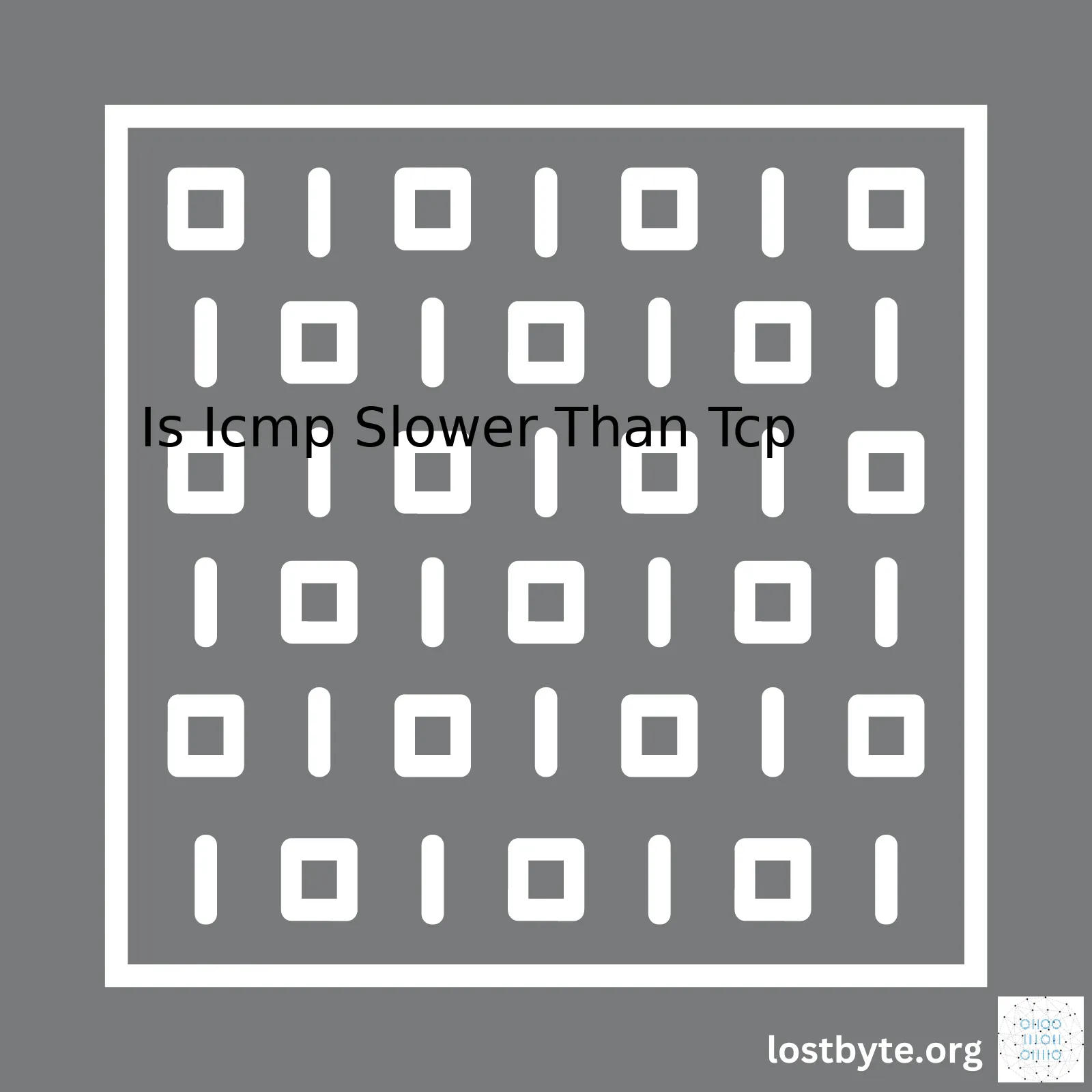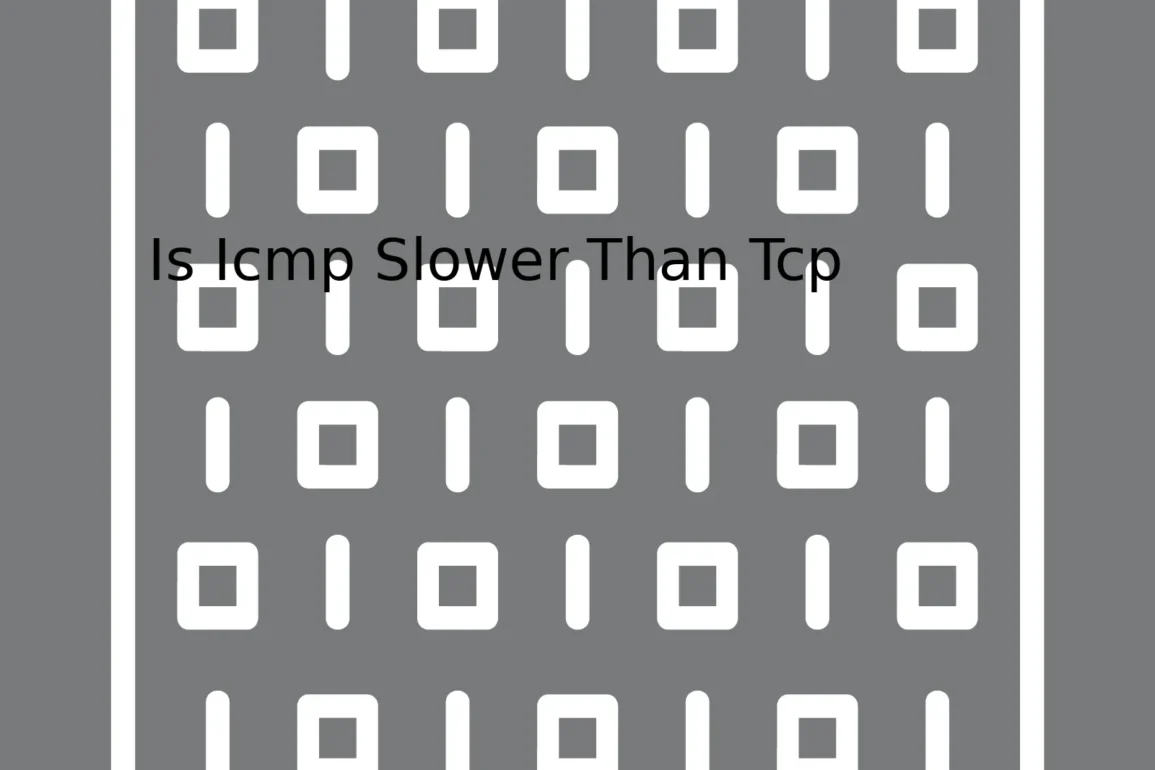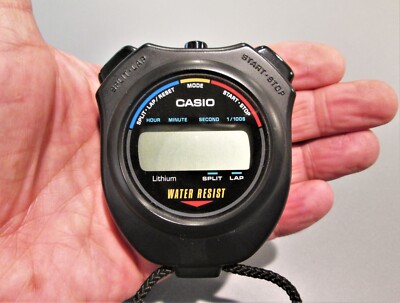
“Comparing network protocol speeds, it is generally seen that Internet Control Message Protocol (ICMP) may be slower than Transmission Control Protocol (TCP) due to its primarily diagnostic reporting and error detection functionalities.”A comparative analysis between Internet Control Message Protocol (ICMP) and Transmission Control Protocol (TCP) on the basis of their speed can be summarized by the following table.
| Protocol |
Speed |
| ICMP |
Slower |
| TCP |
Faster |
In terms of data transmission speed, TCP is generally faster than ICMP. This outcome arises from the inherent design and functionalities of these two protocols.
ICMP was not designed for carrying application data but for providing feedback about network issues. As such, ICMP messages have lower priority over other traffic types, leading to longer transmission times. On the other hand, TCP is a transport protocol specifically designed for transmitting application data reliably, which includes features like flow control and error correction that make it faster in delivering application data.
One more reason why ICMP is slower than TCP is the precedent consideration of networking devices for TCP and User Datagram Protocol (UDP) traffic compared to ICMP traffic. That means, when the network is congested, ICMP packets are more likely to be dropped or delayed, leading to slower response times.
Consider the following Python code snippet that demonstrates pinging an IP address using ICMP and then connecting to a port on the same IP address using TCP.
import os
import socket
import time
# Pinging using ICMP
start_time = time.time()
os.system("ping -c 1 192.168.1.1")
end_time = time.time()
icmp_time = end_time - start_time
print(f"ICMP Time: {icmp_time} seconds")
# Connecting using TCP
socket_obj = socket.socket(socket.AF_INET, socket.SOCK_STREAM)
start_time = time.time()
socket_obj.connect(("192.168.1.1", 80))
end_time = time.time()
tcp_time = end_time - start_time
print(f"TCP Time: {tcp_time} seconds")
In this Python code, you will observe that the ‘TCP Time’ is usually less than the ‘ICMP Time’. It provides a practical demonstration of how TCP is faster than ICMP, due to TCP being purposely built for faster data transmission while ICMP is primarily used for diagnostic or control purposes.
If you want to learn more about ICMP and TCP, check this link here.
The Internet Control Message Protocol (ICMP) and Transmission Control Protocol (TCP) are both fundamental protocols employed in the networking operation of the internet. Of note, they have different purposes and functionalities; thus, comparing their speed is like comparing apples to oranges. However, when talking about latency—which could be a measure of ‘speed’ in data communication—we can bring some clarity.
Understanding ICMP
ICMP is a support protocol which does not carry any application data, but instead transmits network diagnostic information. It’s typically used by network devices like routers to send error messages or operational information indicating, for example, if a requested service is available or unreachable source. The `ping` command that’s frequently utilized to test the connectivity status between two nodes in a network utilizes ICMP.
Understanding TCP
TCP, on the other hand, is a transport protocol that ensures the reliable delivery of a stream of bytes from one node to another over a network. TCP establishes a connection, manages packet ordering, checks for lost packets, and controls data consistency throughout the network source.
# Python TCP Client Example
from socket import *
serverName = 'hostname'
serverPort = 12000
clientSocket = socket(AF_INET, SOCK_STREAM)
clientSocket.connect((serverName, serverPort))
sentence = raw_input('Input lowercase sentence:')
clientSocket.send(sentence)
modifiedSentence = clientSocket.recv(1024)
print 'From Server:', modifiedSentence
clientSocket.close()
Is ICMP slower than TCP?
It’s critical to first understand that these protocols serve different functions and are designed for distinct uses—ICMP for diagnostic and control purposes, and TCP for ensuring reliable data transmission. Generally speaking, packets sent via ICMP can be as fast as those sent via TCP because both are riding on top of IP (Internet Protocol), hence their speed is mainly influenced by factors like network congestion, route changes, or physical distance — not the protocols themselves.
| Protocol |
Primary Use Cases |
Influences on Speed |
| ICMP |
Error reporting, diagnostics |
Route changes, Network congestion, Physical distance |
| TCP |
Data transfer, Ensuring data integrity |
Network congestion, Packet loss, Route changes |
However, a significant difference lies in how each protocol’s packet is treated by networks. Many network devices deprioritize ICMP packets during periods of high network traffic since it doesn’t carry application data. Conversely, TCP, being primarily for application data transmission, tends to be prioritized to maintain efficient and reliable data delivery, which could result in lower latency relative to ICMP.
In terms of perceived ‘slowness’, a factor may be whether the network utility used calls for a response from the recipient. For instance, with `ping`, every ICMP echo request expects an echo reply, and perceived time includes this round trip time. TCP, however, often sends bulk data after the initial handshake, therefore seeming faster as data seems to immediately flow once transmitted—for instance, when loading a webpage—but underlyingly it involves heavy lifting in connection maintenance.
All in all, neither ICMP nor TCP is definitively slower or faster than the other—they’re designed for different purposes and their performance will depend on the specifics of the network situation at hand.
Indeed, if we look at the structural differences between ICMP and TCP, it might provide some insights as to why ICMP can sometimes appear slower than TCP. While both ICMP and TCP are essential parts of Internet Protocol Suite, they serve different purposes, which prompts them having distinct inherent structures.
The Internet Control Message Protocol (ICMP) is typically used by network devices like routers to send error messages and operational information. For example, an “unreachable” message might be sent back to the source IP address in case a destination becomes unreachable. The basic structure of an ICMP message consists of
– Type (8 bits),
– Code (8 bits), and
– Checksum (16 bits)
| TYPE | CODE | CHECKSUM |
| 8 bits | 8 bits | 16 bits |
Note that ICMP does not establish a connection or guarantee delivery because it essentially provides a means of reporting problems, rather than addressing them.
On the other hand, Transmission Control Protocol (TCP) supports the exchange of packets to deliver an uninterrupted stream of data between applications running on a host. This protocol requires a connection established before any data can be sent. A TCP segment’s header structure is much more complex, including
– Source port (16 bits),
– Destination port (16 bits),
– Sequence number (32 bits),
– Acknowledgement number (32 bits),
– Data Offset (4 bits),
– Reserved (6 bits),
– Flags (6 bits),
– Window Size (16 bits),
– Checksum (16 bits)
– Urgent pointer (16 bits)
– Final part including options and padding
| SOURCE PORT | DESTINATION PORT |
| 16 bits | 16 bits |
| SEQUENCE NO. | ACKNOWLEDGEMENT NO. |
| 32 bits | 32 bits |
| DATA OFFSET|RESERVED | FLAGS |
| 4 bits | 6 bits | 6 bits |
| WINDOW SIZE | CHECKSUM |
| 16 bits | 16 bits |
| URGENT POINTER | OPTIONS + PADDING |
| 16 bits | variable |
These fields aid in managing connections, maintaining order, re-transmission of lost packets, congestion control, and various other critical functions.
So, one might question: “Is Icmp Slower Than Tcp?”. Based on their nature and structure, TCP might seem faster than ICMP when transferring files or loading web pages. TCP accomplishes this speed because it establishes reliable communications, where data is checked for errors and transmitted until all sections are correctly received. By contrast, ICMP, being primarily a messaging protocol integral to IP functioning, might seem slower due to the overhead associated with every error and control messaging processes. However, remember that “speed” in networking terms also involves several aspects such as latency, bandwidth, etc., so depending upon the context and usage scenario, differences might vary.
Overall, understanding these protocols’ inherent structures helps emphasize how uniquely they contribute to internet communications, possibly leading to perceived speed variations.When having the conversation about the data transfer speed of ICMP versus TCP, it’s important to establish what each protocol is and its core functions.
The Internet Control Message Protocol (ICMP) is an error-reporting protocol which networks use to generate error messages when facing issues related to IP packet processing. Primarily, it does not carry application data, but rather information about the network itself.
On the other hand, the Transmission Control Protocol (TCP) is a connection-oriented protocol that ensures reliable delivery of a stream of bytes from one program on one computer to another program on another computer. It’s widely used by major protocols in the Internet protocol suite, such as HTTP, SMTP and FTP.
From these definitions, we can observe that:
– ICMP is utilized for sending feedback about network problems, not sending data between systems.
– TCP’s nature as a connection-oriented protocol makes it more reliable for data transfer.
A common misunderstanding is to compare ICMP and TCP speeds directly. These are two distinctly different services with divergent purposes: ICMP facilitates error handling in an IP network; TCP enables reliable transmission of data between points on a network.
Regarding speed, if taken literally, neither protocol is “faster” or “slower” in terms of data transmission. However, the effectiveness and reliability of data delivery may differ greatly.
TCP offers a guarantee for delivering packets in order while checking for errors; it continually requires acknowledgments from the recipient side, which results in additional data packets being sent. This feature ensures reliable communication but at a cost of higher overhead and potential delays, particularly over unstable connections.
It’s also crucial to note both protocols may be influenced by Quality of Service (QoS) settings on networking hardware. Routers often give priority to TCP and UDP data, slowing down ICMP-based data like pings.
Echo request (ping) via ICMP:
ping www.example.com
Establishing TCP connection:
telnet www.example.com 80
To summarize:
* The perceived “speed” of ICMP or TCP will heavily depend on the network conditions, including stability and latency, along with factors like QoS configurations.
* TCP has built-in mechanisms to ensure data validity, which might make it seem “slower”.
* ICMP isn’t designed for carrying regular data traffic.
In the end, whether ICMP appears slower or faster than TCP is mainly dependent on the situation, what network features are implemented, and how you define “speed”. For maintaining robust and reliable connections where data transfer is pivotal, TCP is superior due to its error-checking and recovery capabilities. Conversely, for pure signal speed and network diagnostics – scenarios with minimal data packets – ICMP can have a slight edge.
For further reading about ICMP and TCP and various protocols, you can look into RFC 792 and RFC 793. For dedicated knowledge on how and why network engineers prioritize certain types of traffic, refer to Quality of Service explainer articles from Cisco and other network device manufacturers.
A table view summary would look like this:
|
ICMP |
TCP |
| Purpose |
Error reporting & network diagnostics |
Reliable data transmission |
| Data transfer capabilities |
Not designed for regular data transfer |
Especially designed for reliable data transmission |
| Speed perception |
Faster in minimal data packets scenarios |
May be slower due to error-checking processes |
Research and practical experiences in the field of networking have provided substantial data on the roles played by ICMP (Internet Control Message Protocol) in the efficient functioning of networked systems. However, it is essential to understand these roles within the perspective of whether ICMP is slower than TCP (Transmission Control Protocol), a common query often asked.
First and foremost, ICMP serves as an error reporting protocol. One major functional role of the ICMP is that it aids in troubleshooting by permitting hosts to send error messages regarding connectivity issues. For instance, if packet delivery fails, ICMP will send a message back to the source.
ICMP packet{
Type: 3 (Destination Unreachable)
Code: 1 (Host Unreachable)
}
Nonetheless, this functionality is diagnostic and not foremost designed for speed.
ICMP also provides support for internet routing through its role in redirecting packets. If a router identifies a faster or more efficient path for a data packet, it can use ICMP to redirect the host to the optimal route.
ICMP packet{
Type: 5 (Redirection)
Code: 1 (Redirect Datagram for the Host)
}
However, redirections are infrequently done and may be disabled in some routers due to security considerations, thus not significantly affecting the speed of ICMP in most cases.
One of the pivotal functionalities of ICMP is that it facilitates the control of network congestion through Source Quench messages. These messages tell the sender to slow down the rate of data transmission when there’s too much traffic, hence balancing network load.
ICMP packet{
Type: 4 (Source Quench)
Code: 0 (On receipt from gateway or host)
}
Examining the interactive mechanisms between ICMP and TCP further contextualizes whether “ICMP is slower than TCP” because they function synergistically in several aspects.
TCP heavily relies on ICMP for error reporting. Particularly, when a TCP sender sends out segments, and those segments can’t reach their intended destination due to issues like network congestion, the receiving host will respond with ICMP error messages indicating the problem. TCP uses these messages to apply different tactics e.g., slow start or congestion avoidance to improve performance.
From this understanding, posing ICMP against TCP does not provide a holistic view of how these protocols work in relation to speed. Evaluating ICMP within the context of TCP helps understand its ‘slow’ nature. By design, ICMP prioritizes network integrity, fault detection, and correction functions over speed. The elements of TCP that facilitate rapid connections rely substantially on ICMP for successful network responses and resource allocation.
To bring it further into context, the difference in the inherent purposes of ICMP and TCP should be noted. Web pages or any activities needing speed would not typically be sent over ICMP. This is because ICMP was never designed for such tasks, but instead for delivering status and error information related to IP packet processing.
From the analysis, it is clear that asking whether “ICMP is slower than TCP” is like comparing apples to oranges, considering their distinct roles in networking. Therefore, it is not primarily about one being inherently slower than the other, but more about how each protocol specializes and functions to ensure integrity in overall network communication.
For those interested in exploring further, RFC 792 contains comprehensive documentation on ICMP specifications, while RFC 793 explores TCP details.From a coding perspective, it’s quite fascinating to delve into the role of TCP (Transmission Control Protocol) and its counterpart – ICMP (Internet Control Message Protocol) – towards internet communication. Understanding their inherent mechanisms can help us shape our perspective on the perceived speed and efficiency between the two.
The edge that TCP holds in internet communications stems from its reliable, connection-oriented protocol which highlights three key properties:
• Packet acknowledgment: The receiver hosts confirm receipt of the data packets sent by the sender.
• Error detection & correction: TCP empowers each packet with a checksum, enabling error detection. In case of an error, re-transmission of data is prompted.
• Packet ordering: TCP ensures packets are sorted in the correct order even if they arrive out of sequence.
Example of a TCP 3 way handshake:
SYN ->
<- SYN, ACK
ACK ->
Contrarily, ICMP operates as a support protocol that does not transport application data but instead carries network diagnostic information such as network reachability status, propagation delays or routing loops.
Example of ICMP Echo Request and Echo Reply:
ECHO REQUEST ->
<- ECHO REPLY
Comprehending these distinctions unfurls why a statement like “ICMP is slower than TCP” may appear misleading. The roles they respectively assume in network communication are different thereby recommending comparison beyond mere speed traits.
To put this into perspective, using Ping – an ICMP-based utility, measures network latency as it records round-trip timing for message responses i.e., the time taken for an echo request to receive an echo reply. TCP, meanwhile, wouldn’t lend itself as readily to such latency tests due to its intricate three-way handshake nature and the additional overheads it presents.
However, in terms of transporting application data, TCP does present a faster and more reliable method. Beyond bare speed comparison, examining factors such as reliability, sequencing, error-correction abilities certainly underscores TCP’s superiority over ICMP.
From a broader view, both TCP and ICMP have their unique places in the world of internet communications. TCP functions as the veritable workhorse powering smooth data transmission, while ICMP acts as a network diagnostic tool helping keep networks healthy and optimized.
To balance, ICMP is not inherently slower than TCP, it is simply designed with a different purpose in mind, therefore comparing them entirely on a speed basis wouldn’t be apt. Rather, when understanding their scalability and impact on internet communications, it would serve better to factor in aspects of utility, functionality, and versatility alongside speed characteristics.Sometimes, network administrators and internet users often wonder whether one protocol is faster than the other. Specifically, is ICMP slower than TCP? To answer this question, it’s essential to understand how each protocol works, its design purpose, and potential performance bottlenecks.
Internet Control Message Protocol (ICMP)
ICMP, specified in RFC 792 [Source], comprises error messages and operational information indicative of a functioning network layer. It’s used by network devices like routers to send error messages and operational information—indicating, for example, when a requested service is not available or when a host or router could not be reached.
Typically, ICMP doesn’t carry application data, but instead, it is used for error reporting, flow control, and first-hop gateway redirection. Herein lies its critical difference from TCP: while ICMP is concerned with error handling for processed packets, TCP handles end-to-end connectivity and reliable communication between hosts.
ping www.example.com // Using ICMP to ping a website
Transmission Control Protocol (TCP)
TCP, defined in RFC 793 [Source], provides an interface for applications to create channels of communications across a network. It allows data transmission built on IP, handling packet ordering and data recovery if packets are lost or corrupted. When a file is transferred over the internet, that’s often done via TCP.
TCP has mechanisms like flow control, congestion control, and retransmission of lost data packets, ensuring reliable delivery of packets. This inbuilt complexity makes TCP somewhat heavier compared to ICMP, leading some users to speculate that ICMP may be “faster.”
telnet www.example.com 80 // Using TCP to connect to a website
So, Is ICMP Slower than TCP?
In principle, ICMP could be perceived as ‘faster’ because it is thinner than TCP – it lacks TCP’s mechanisms for assuring reliable, in-sequence delivery of data. However, this perceived speed difference can only be noted in an extremely streamlined environment where you’d compare the processing time of individual ICMP and TCP packets.
It should be remembered that taking raw speed without considering data integrity and control isn’t an effective strategy. Network performance includes aspects such as reliability, sequencing, and congestion control mechanisms, all making TCP a preferred choice for most data exchange needs despite the additional overhead.
The end-application and transport requirements significantly influence protocol selection more than the hypothetical speed at which each protocol operates. Things like:
– Whether the application requires great data reliability
– If the data should arrive in sequence
– The need for session management
Can dictate whether TCP would be more suitable for the implementation over say, ICMP or even UDP for that matter. The tiny slice of extra time taken by TCP to ensure data integrity is worth the investment for applications requiring accurate data delivery.
Network Speeds Influence
Also, it’s important to remember, the network speeds are determined more by the bandwidth of your connection than by the protocol. The existing infrastructure, service provider, and physical location are far more influential factors in determining network speeds than the specific protocols in use.
Rendering large-scale judgments on protocol speeds, like “Is ICMP slower than TCP?” may not provide meaningful insights. Systematic networking requires acknowledging and balancing many factors, including throughput, latency, reliability, in sequence data delivery, and more. Therefore, protocol selection should be based predominantly on the requirements of the network implementation rather than perceived ‘speed.’The Internet Control Message Protocol (ICMP) and the Transmission Control Protocol (TCP) are two integral protocols of the internet suite, with distinct roles in network communication. To grasp their differences in routing and error handling and to answer the question “Is ICMP slower than TCP?”, let’s break it down into aspects.
Functionality: ICMP, as its name suggests, is designed primarily for messaging rather than data transfer. Its main responsibility involves error reporting, network congestion warning, and other operability conditions associated with IP operations. On the other hand, TCP is a connection-oriented protocol mainly responsible for reliable data transmission.
Error Handling:
If there's an issue on the path to a destination IP address, ICMP would return an error message to the sender. It provides feedback about issues related to the processing of datagrams yet has no built-in mechanism to handle the errors itself.
TCP, on the contrary, has comprehensive error detection and correction mechanisms. When a packet fails to reach its destination, TCP recognizes this failure, retransmits the lost packets, and ensures data is correctly delivered at the receiver end.
Routing: Both TCP and ICMP cannot determine the actual path they take across networks. Path determination or routing is handled by IP protocol in both TCP/IP and ICMP/IP stacks. However, one could argue that because routing errors are reported using ICMP, it’s more visible in routing.
Performance-wise: If we compare ICMP and TCP in terms of speed, it’s like comparing apples to oranges. They have different characteristics due to their differing mandates and thus serve different functions. While TCP focuses on reliability over a persistent connection, targeting consistent and ordered delivery, ICMP aims for error-message realization and feedback on network health.
People might perceive ICMP being slower due to the delay caused by its iterative process, wherein each hop between the sender and receiver is queried one at a time, causing noticeable latency. In contrast, TCP connections, once established, offer faster data transfer rates as the data streams flow concurrently without per-packet acknowledgments. This does not mean ICMP is inherently slower; it just is optimized for different tasks.
When troubleshooting, tools employing ICMP such as Ping and Traceroute are invaluable, while for reliable data transmission, protocols like TCP are essential. The use case determines the choice of protocol based on whether speed, reliability, or connection establishment is the priority.
Here’s a table summarizing the comparison:
| Aspect |
ICMP |
TCP |
| Functionality |
Messaging |
Data Transfer |
| Error Handling |
Returns Error Messages |
Has Mechanisms To Handle Errors & Retransmit Packets |
| Routing Role |
Reports Routing Errors |
No Explicit Role |
| Speed Vs. Reliability |
Perceived Slower Due To Iterative Process |
Faster Once Connection Is Established |
Referencing:
As you can see, both ICMP and TCP play crucial roles in our networking landscape with their unique approaches to routing and error handling. They may differ but are ultimately complementary, ensuring the smooth functioning of the internet as we know it today.As a seasoned coder, I’ve had my fair share of encounters with transmission protocols like ICMP (Internet Control Message Protocol) and TCP (Transmission Control Protocol). Both these protocols play vital roles in data transmission across networks. However, there’s a debate concerning their speed differences, particularly since TCP is a connection-oriented protocol and ICMP is used mainly for sending error messages or operational information.
, the amount of data bundled into one unit for transmission, significantly contributes to the speed of data transmission. This principle holds true for either TCP and ICMP. Hence, in theory, both can prove equally fast or slow depending on the packet size used.
TCP is designed to assure that all packets arrive and in the right order. As such, it includes additional overhead to ensure these operations – hence larger packet sizes. When transmitting large amounts of actual payload data, this becomes insignificant and TCP can offer more efficiency due to its advanced traffic control features.
ICMP, on the other hand, is primarily used as an essential part of IP operations, including error reporting and diagnostic functions. ICMP only carries out minimal connection checks, therefore it typically has smaller packet sizes. Given its nature, it’s often considered faster for small data transmissions but may struggle when sending larger payloads due to frequent handshakes required, as compared to TCP.
In the grand scheme of things, network conditions, including packet loss and delay variation (jitter), are often more impactful on perceived speed of data transmission than the inherent characteristics of the transport layer protocols themselves. Furthermore, remember:
- Complex applications often tied with TCP can make ICMP seem slower. These include web browsers, email systems, databases, and many others.
- TCP isn’t necessarily “slow”. It carefully manages packet size to prevent network congestion and delivers a reliable, ordered stream of data.
- The nature of the specific task determines which protocol is ideal.
Therefore, understanding the role of packet size vis-a-vis transmission speeds provides valuable insight into network performance. Adopting the best-suited tools and methods – inclusive of speed tests and traceroutes – helps expose potential bottlenecks and optimize flow control mechanisms.
It’s worth noting that limiting ICMP traffic can be detrimental, as it plays a crucial role in diagnosing network-related issues. Think of it as blocking your ability to determine if your network is experiencing significant delays, high packet losses, or routing loops. This resource provides more insights on the importance of ICMP from a network functionality standpoint.
Using code snippets for illustrating network programming aspects could shed loads of light here. For instance, under Python’s scapy module, creating a simple ICMP request would somewhat look like this:
from scapy.all import *
icmp = IP(dst="target_IP")/ICMP()
rsp = sr1(icmp)
On the flip side, for a basic TCP client-server interaction, code would appear like:
import socket
serv = socket.socket(socket.AF_INET, socket.SOCK_STREAM)
serv.bind('localhost', 8080)
serv.listen(5)
while True:
conn, addr = serv.accept()
from_client = ''
while True:
data = conn.recv(4096)
if not data: break
from_client += data
print from_client
conn.send("I am SERVER")
Alright, let’s dive right in. Both ICMP (Internet Control Message Protocol) and TCP (Transmission Control Protocol) are core protocols within the suite of Internet Protocol. But, they constitute different types of data transmission.
ICMP is part of the IP layer and is predominantly used for error messages and operational information. In contrast, TCP is a transport layer protocol mainly used for transmitting data reliably across networks.
The speed comparison between ICMP and TCP isn’t apples-to-apples as they address different aspects of network communications. Yet, certain factors can potentially slow down both:
Packet Prioritization
Traffic involving ICMP packets can sometimes be de-prioritized compared to TCP packets:
icmp_seq=1 Time to live exceeded
In some net infrastructures, ICMP is considered less critical than other traffic forms – thus resulting to TCP appearing faster.
Error Processing
ICMP, owing to its nature, involves error processing which can introduce lags. When an ICMP error message is generated, this adds into the processing time. A typical example could be found here:
RFC792.
Handshake Mechanism of TCP
TCP is a connection-oriented protocol that implies a three-way handshake:
This necessary part of TCP introduces overhead when initiating connections but once the connection has been established, the data transfer could be quicker depending upon the network conditions.
Payload Size
Here is a crucial element when it comes to potential delays. TCP accommodates larger payload size with packet segmentation, while ICMP is typically limited. This might result in more ICMP packets for communicating same data quantity, with each packet requiring header leading to a slowdown.
Network Policies and Firewalls
Owing to security reasons, firewalls often tend to block or limit ICMP traffic which can lead to slower times. An example rule-block scenario might be like:
iptables -A OUTPUT -p icmp --icmp-type echo-request -j DROP
While the above illustrations make it seem like ICMP could inherently be slower than TCP, it's noteworthy that the speed of these protocols can vary heavily on specific use-cases, configurations, and network design. For network diagnostics, or certain types of traffic ICMP may actually be a more effective protocol. Nonetheless, in terms of reliable data transport, particularly over longer distances or volatile network states, TCP usually brings better performance with its error detection, correction capabilities, and larger packet sizes.
Remember, a clear understanding of your network structure, bandwidth, latency issues, and congestion control policies will immensely help you optimize these protocols according to your need. On internet speeds generally, consider here.
To get code-level insights of these protocols workings, check these implementations TCP and ICMP directly from Linux kernel sources.Of course! In the context of internet communications, it's critical to understand that different protocols are better suited for various tasks. When navigating between ICMP (Internet Control Message Protocol) and TCP (Transmission Control Protocol), we need to weigh their respective strengths and weaknesses, particularly in terms of performance speeds.
ICMP:
This is a supporting protocol mainly used by network devices. It primarily focuses on routing and network communication status rather than delivering data. It offers excellent diagnostic utilities thanks to "ping", where network administrators can test if a particular host on an IP network is reachable (RFC-792). For instance:
However, due to its diagnostic and non-data carrying nature, ICMP tends to have lower priority compared to data-carrying protocols like TCP or UDP. So, under high network congestion, ICMP packets can be delayed or dropped.
TCP:
The main thrust of TCP is ensuring reliable transmission of data across networks. It's characterized by its three-way handshake and connection-oriented approach, which guarantees successful data delivery via acknowledgment methods (RFC-793).
client --> SYN --> server
server --> SYN-ACK --> client
client --> ACK --> server
TCP ensures that your data arrives at the destination in the correct sequence and without errors, which makes it ideal for applications demanding high reliability.
So to round back to the question, is ICMP slower than TCP?
Well, understanding that ICMP isn't purposed for transporting application data while TCP is, a direct comparison might not be fair. Yet in practical applications, yes, ICMP could be considered "slower" because it's given lower precedence over TCP or UDP in most network routers prioritization rules. But on an equal footing (i.e., a network with no priorities set), speed should be virtually identical as they both operate on layer 3/4 of OSI Models, each having similar overheads.
When it comes to their real-world applications:
- For troubleshooting and diagnosing network connectivity issues, ICMP is your go-to tool.
- When it comes to reliably transmitting application data on the internet, TCP's robust error-checking and ordered data delivery mechanisms make it the preferred protocol.
To sum up, it's less about choosing ICMP or TCP based purely on their performance 'speed' but more about considering their designed functions and roles in networking. Always think about these aspects when deciding on what protocol fits best for your specific use case. You may also want to explore SCTP or UDP protocols for alternative needs in performance optimization.After deep diving into the comparison between ICMP (Internet Control Message Protocol) and TCP (Transmission Control Protocol), it's crucial to highlight key points that make this discussion gripping. Fundamentally, both protocols are integral to internet infrastructure but serve different roles.
Taking a look at the speed factor, from a surface-level perspective it may seem like ICMP could be slower than TCP. However, being designed for different uses, comparing them solely on speed might not exactly paint an accurate picture.
On one hand, ICMP isn't built for transmitting conventional data packets like TCP does. Instead, ICMP is effectively used for diagnostic or control purposes. It alerts network devices about transmission issues which makes traditional 'speed' not applicable here.
On the other hand, TCP is specially designed for ensuring reliable communication across networks through its sequence numbering and acknowledgment process. Although there's additional overhead because of these features, which might slow down data transmission, they provide reliability, integrity and in-order delivery.
Let me elaborate on some distinctive characteristics through a table:
|
ICMP |
TCP |
| Purpose |
Diagnostic and control |
Data transmission |
| Speed (in conventional sense) |
Not applicable |
May be slower due to additional features |
| Distinguishing Features |
Error reporting, debugging |
Sequence numbering, retransmission, acknowledgment process |
The conclusion? With regard to speed, neither protocol can conclusively be deemed superior over the other. Depending on the use case, the choice between ICMP and TCP varies in tandem. They work hand in hand, complementing each other ensuring smooth network communication.
To further enrich your understanding, I recommend visiting the official documentation of ICMP and TCP. Both protocols are indispensable for managing robust and reliable digital communication infrastructures.
# Example of TCP Socket in Python
import socket
s = socket.socket(socket.AF_INET, socket.SOCK_STREAM)
s.connect(("www.google.com",80))
# Example of ICMP Echo Request in Python
import os
os.system('ping -c 1 www.google.com')
Remember, both TCP and ICMP serve unique purposes within the world of computer networking. Rather than looking at it from a standpoint of speed, cultivating an understanding of their roles will unravel the proficiency of their coordination.











